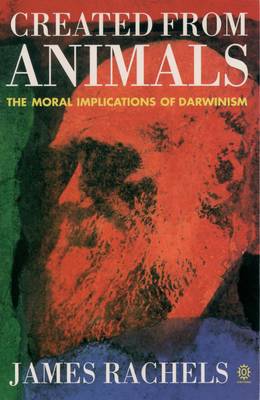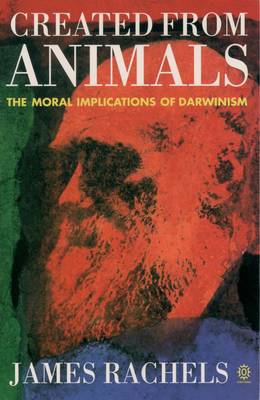
- Retrait gratuit dans votre magasin Club
- 7.000.000 titres dans notre catalogue
- Payer en toute sécurité
- Toujours un magasin près de chez vous
- Retrait gratuit dans votre magasin Club
- 7.000.0000 titres dans notre catalogue
- Payer en toute sécurité
- Toujours un magasin près de chez vous
39,45 €
+ 78 points
Description
From Bishop Wilberforce in the 1860s to the advocates of "creation science" today, defenders of traditional mores have condemned Darwin's theory of evolution as a threat to society's values. Darwin's defenders, like Stephen Jay Gould, have usually replied that there is no conflict between science and religion--that values and biological facts occupy separate realms. But as James Rachels points out in this thought-provoking study, Darwin himself would disagree with Gould. Darwin, who had once planned on being a clergyman, was convinced that natural selection overthrew our age-old religious beliefs.
Created from Animals offers a provocative look at how Darwinian evolution undermines many tenets of traditional philosophy and religion. James Rachels begins by examining Darwin's own life and work, presenting an astonishingly vivid and compressed biography. We see Darwin's studies of the psychological links in evolution (such as emotions in dogs, and the "mental powers" of worms), and how he addressed the moral implications of his work, especially in his concern for the welfare of animals. Rachels goes on to present a lively and accessible survey of the controversies that followed in Darwin's wake, ranging from Herbert Spencer's Social Darwinism to Edward O. Wilson's sociobiology, and discusses how the work of such influential intellects as Descartes, Hume, Kant, T.H. Huxley, Henri Bergson, B.F. Skinner, and Stephen Jay Gould has contributed to--or been overthrown by--evolutionary science.
Western philosophy and religion, Rachels argues, have been shaken by the implications of Darwin's work, most notably the controversial idea that humans are simply a more complex kind of animal. Rachels assesses a number of studies that suggest how closely humans are linked to other primates in behavior, and then goes on to show how this idea undercuts the work of many prominent philosophers. Kant's famous argument that suicide reduces one to the level of an animal, for instance, is meaningless if humans are, in fact, animals. Indeed, humanity's membership in the animal kingdom calls into question the classic notions of human dignity and the sacredness of human life. What we need now, Rachels contends, is a philosophy that does not discriminate between different species, one that addresses each being on an individual basis.
With this sweeping survey of the arguments, the philosophers, and the deep implications surrounding Darwinism, Rachels lays the foundations for a new view of morality. Vibrantly written and provocatively argued, Created from Animals offers a new perspective on issues ranging from suicide to euthanasia to animal rights.
Created from Animals offers a provocative look at how Darwinian evolution undermines many tenets of traditional philosophy and religion. James Rachels begins by examining Darwin's own life and work, presenting an astonishingly vivid and compressed biography. We see Darwin's studies of the psychological links in evolution (such as emotions in dogs, and the "mental powers" of worms), and how he addressed the moral implications of his work, especially in his concern for the welfare of animals. Rachels goes on to present a lively and accessible survey of the controversies that followed in Darwin's wake, ranging from Herbert Spencer's Social Darwinism to Edward O. Wilson's sociobiology, and discusses how the work of such influential intellects as Descartes, Hume, Kant, T.H. Huxley, Henri Bergson, B.F. Skinner, and Stephen Jay Gould has contributed to--or been overthrown by--evolutionary science.
Western philosophy and religion, Rachels argues, have been shaken by the implications of Darwin's work, most notably the controversial idea that humans are simply a more complex kind of animal. Rachels assesses a number of studies that suggest how closely humans are linked to other primates in behavior, and then goes on to show how this idea undercuts the work of many prominent philosophers. Kant's famous argument that suicide reduces one to the level of an animal, for instance, is meaningless if humans are, in fact, animals. Indeed, humanity's membership in the animal kingdom calls into question the classic notions of human dignity and the sacredness of human life. What we need now, Rachels contends, is a philosophy that does not discriminate between different species, one that addresses each being on an individual basis.
With this sweeping survey of the arguments, the philosophers, and the deep implications surrounding Darwinism, Rachels lays the foundations for a new view of morality. Vibrantly written and provocatively argued, Created from Animals offers a new perspective on issues ranging from suicide to euthanasia to animal rights.
Spécifications
Parties prenantes
- Auteur(s) :
- Editeur:
Contenu
- Nombre de pages :
- 250
- Langue:
- Anglais
Caractéristiques
- EAN:
- 9780192861290
- Date de parution :
- 28-10-99
- Format:
- Livre broché
- Format numérique:
- Trade paperback (VS)
- Dimensions :
- 134 mm x 202 mm
- Poids :
- 281 g

Les avis
Nous publions uniquement les avis qui respectent les conditions requises. Consultez nos conditions pour les avis.






